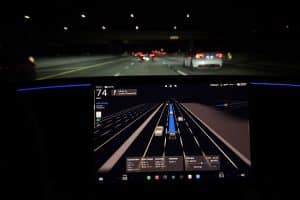Tesla’s leadership status as king of the electric vehicle sector has been established through several years of innovation and the company’s ability to influence an entire industry. Now that more automakers have adopted plans for electrification, it comes down to preparation, according to Howard Yu, IMD Business School LEGO Professor of Management & Innovation.
Yu joined Yahoo! Finance to discuss what is priming companies for the future, along with where they rank in terms of preparedness. Yu believes Tesla’s recent performances in 2020 and 2021 have only solidified the company’s recognition as a mainstay in the sector. While the past two years are key indicators of Tesla’s ability to adapt to hardships, they are more indicative of the company’s relevance to the future. Tesla, for one, is in prime position to dominate the next several years, especially in autonomy and chip building, simply because of what it has been able to accomplish in the past few years.
Most impressive to Yu seems to be Tesla’s scrappy ability to navigate the global chip shortage. Yu asks the rhetorical question of how companies are going to be able to scale software capability and autonomy in the coming years, skeptical of whether or not companies will be able to handle the evolution of software and its part in vehicles moving forward.
“So you talk about the automotive sector. And of course, it’s no longer just about building the electric vehicle. These days, everybody can build electric vehicles. But it’s really this idea, how do you able to scale up the software capability, autonomous driving, as well as building chipset around the electronic component?,” Yu asked, only to give an answer that many of those who follow the EV sector would know. “And the late lead shortages of the global semiconductor sector really just exposed how important these new future capabilities are. And from that perspective, Tesla, obviously, ranks number one. And you’re looking at Toyota. They have been able to stockpile, in terms of chipset, until most recently because of their supply chain digitization.”
Tesla navigated the 2021 chip shortage by developing microcontroller variants internally. The developments helped the company avoid massive stoppages in production, which halted many other automakers’ manufacturing lines.
Essentially, the past two years have shown which companies are prepared for a new type of vehicle. As Yu mentioned, nearly every automotive company in the world has announced plans for electrification, but bringing those products to market is what is proving to be increasingly difficult. Additionally, Tesla’s ability to fend off competition and really establish itself as a leader for so many years, continuing to improve an already industry-leading product, is what is most impressive to Yu. “If you miss a product life cycle, then you are really in a precarious position. If you miss twice or three times, then you send home packing. And what we’ve been seeing is an organization that can stay on top of competition in this particular sector are the ones who are very entrepreneurial,” Yu adds. “Meaning, they are able to branch out to new services, bringing out new business models as exemplified by Amazon, and going through many, many of these moonshot innovations as well.”





